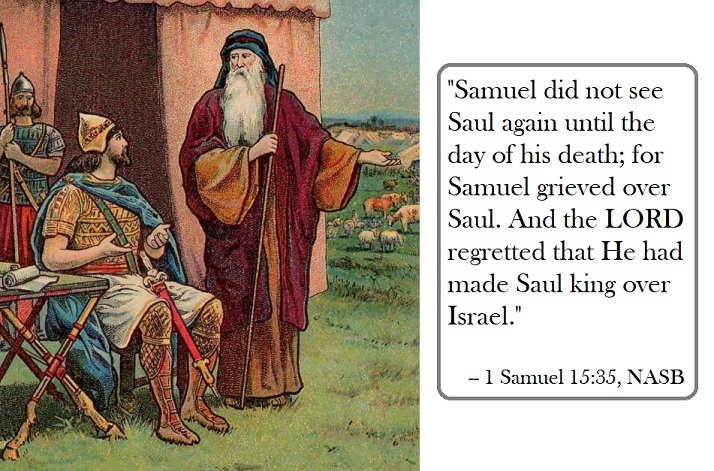“Go therefore and make disciples of all the nations…teaching them to observe all that I commanded you; and lo, I am with you always, even to the end of the age” (Matthew 28:19-20, NASB).
——————–
Contents:
1) God’s Regret and Foreknowledge (Kyle Pope)
2) A Clear View of Him Who is Invisible (Jason Hardin)
3) A Vital Perspective (Frank Himmel)
4) Fleeing and Pursuing (video sermon, Tom Edwards)
5) News & Notes
——————–

-1-
God’s Regret and Foreknowledge
Kyle Pope
Although God chose Saul to be the first king over the nation of Israel, after he disobeyed the Lord’s command to destroy Amalek, the Holy Spirit records God’s declaration to Samuel — “I greatly regret that I have set up Saul as king, for he has turned back from following Me, and has not performed My commandments” (1 Sam. 15:11a, NKJV). This is restated, after Samuel told Saul that God had rejected him as king. The text records, “And Samuel went no more to see Saul until the day of his death. Nevertheless Samuel mourned for Saul, and the Lord regretted that He had made Saul king over Israel” (1 Sam. 15:35). This reveals a challenging issue concerning the nature of God. Scripture makes it clear that God “knows all things” (1 John 3:20), and is fully aware of all things that will happen in the future. David reveals that God knew the words he would speak before he said them (Ps. 139:4). Daniel said that God knows “what shall come to pass” (Dan. 2:29, KJV). God tells Isaiah that only He can “make known the end from the beginning” (Isa. 46:10, NIV). How then can it be that the actions of Saul caused God to feel “regret” (1 Sam.15:11, 35)?
The word used in 1 Samuel 15:11 and 35 is the Hebrew verb nacham. It means “to be sorry, console oneself, repent, regret, comfort, be comforted” (Brown, Drivers, Briggs, Hebrew and English Lexicon of the Old Testament, 636-637). The context determines when it has the positive sense of comfort and when it has the negative sense of sorrow or regret. For example, when Noah was born his father Lamech said, “This one will comfort (nacham) us concerning our work and the toil of our hands, because of the ground which the Lord has cursed” (Gen. 5:29, NKJV). When Isaac married Rebekah, Scripture tells us that in his marriage “Isaac was comforted (nacham) after his mother’s death” (Gen. 24:67). In other contexts, however, it can refer to the sorrow that leads to a change in behavior. For example, God, referring to the northern kingdom of Israel as “Ephraim,” the name of one of its most prominent tribes, quotes her to say, “Surely, after my turning, I repented (nacham); and after I was instructed, I struck myself on the thigh; I was ashamed, yes, even humiliated, because I bore the reproach of my youth” (Jer. 31:18-19).
This is the same word that is used in Genesis 6:6-7 concerning God’s anger over the wickedness of the world before the flood. Scripture declares, “the Lord was sorry (nacham) that He had made man on the earth, and He was grieved in His heart” (Gen. 6:6). This is restated after declaring His intention to flood the earth. The Lord said, “I am sorry (nacham) that I have made them” (Gen. 6:7b). Older translations put it that “it repented” God that He had done this (KJV, ASV). This, however, reflects a now archaic use of the word repent that does not involve wrongdoing. The New Oxford American Dictionary now defines the word repent to mean, “feel or express sincere regret or remorse about one’s wrongdoing or sin.” God cannot commit sin, and therefore cannot repent in that sense of the word.
A similar misunderstanding can arise from modern translations that render this word regret when applied to God. To say that God “regretted that He had made Saul king over Israel” (1 Sam. 15:35, NKJV, NASB, ESV), leaves the impression that God did not know what Saul would do. This is not the idea. James declared, “known to God from eternity are all His works” (Acts 15:18). The regret that God felt over Saul’s actions or the sinfulness of the world before the flood was not the result of ignorance or surprise. He knows what all men will do before they do it.
So how are we to understand God’s attitude toward Saul and the world before the flood? The key may rest in some parallel wording in each of these passages. Notice that in the text in Genesis while it first says that God was “sorry(nacham)” it restates this in slightly different wording by adding that, “He was grieved in His heart” (Gen. 6:6b). This may be a type of Hebrew parallelism, by which the same idea is expressed in two similar ways for emphasis. If so, this would clarify that nacham when applied to God is not talking about repentance from wrongdoing, or regret over something God did not know, but sadness, sorrow, and grief over man’s actions. When one grieves it is not always over wrongdoing, or even something he did not know would happen. To grieve is to feel the pain caused by an action that takes place.
In the account of Saul’s sin we see a similar parallel construction. God was said to “regret” (NKJV, NASB) or be “grieved” (NIV) that He made Saul king, and Samuel is said to be “grieved” (NKJV, KJV), “distressed” (NASB), or “troubled” (NIV) by God’s decision to remove Saul (1 Sam. 15:11; cf. 15:35). Here the parallel is not two statements about God, but a statement about Samuel and God. Now, some translations make this seem as if Samuel’s attitude is that he “was angry” (RSV, NRSV) or “was wroth” (ASV) with God, but the same word for Samuel’s attitude is used in verse 35, again in parallel with God’s attitude and virtually all translations take it to refer to Samuel’s grief, sorrow, or sadness—not anger at God. If this is a type of parallelism, this paints a different picture. It is not that God did not know what would happen. Instead, it simply shows the emotion that He felt when it actually happened. God’s foreknowledge did not take away the sorrow He felt when sin and rebellion happened in time.
In First Samuel there is another interesting use of this word in the same context. In verses 11 and 35 nacham is used of God’s sorrow over Saul’s action, but in verse 29 it is used twice of God’s unchangeable will. When Saul tried to argue with Samuel rather than simply acknowledge his sin, Samuel said of God, “the Strength of Israel will not lie nor relent (nacham). For He is not a man, that He should relent (nacham)” (NKJV). This is actually a paraphrase of a passage from the Law of Moses. God led Balaam to declare, “God is not a man, that He should lie, Nor a son of man, that He should repent (nacham); Has He said, and will He not do it? Or has He spoken, and will He not make it good?” (Num. 23:19). Both prophetic declarations reveal that when God has decided something, man cannot change His will. Is this a contradiction? In the same passage, is God at one point said to do something that a few verses later He is said not to do? Old Testament commentators Keil and Delitzsch suggest that these passages are approached from different perspectives. In First Samuel verses 11 and 35 they claim that God is speaking “anthropomorphically,” that is, as things appear to man (2.158). In other words, in human interaction with God something might appear to reflect a change, even though God knew all along what He would do. Keil and Deilitzsch go on to suggest that in verse 29, Samuel describes God “theomorphically,” that is, as things appear to God (ibid.). In other words, He knows what He will ultimately do, and does not change. Undoubtedly, when an infinite God communicates to finite creatures many things about His revelations are dependent upon whether they are seen from a divine or human perspective.
Clearly, there have been times when the prayers of men have been able to change God’s mind to some extent. When Israel sinned and God was ready to destroy the Israelites, Moses’s appeal to Him resulted in the fact that the, “Lord changed His mind (nacham) about the harm which He said He would do to His people” (Exod. 32:14, NASB). This doesn’t mean that God didn’t know what He would do all along, but sometimes the opportunities He offers to people to interact with Him in repentance and prayer are described in terms we can understand. Sometimes this appears to be a way of providing man the chance to change, or appreciate God’s mercy. The sorrow God felt over the wickedness of the world in the days of Noah, or the sinfulness of Saul was not something that caught Him by surprise. Rather, in revealing that these things brought Him sorrow it shows the pain that a loving God can feel when His creation rejects Him. Those who are His people should be moved by this and diligently seek to serve Him faithfully lest we “grieve the Holy Spirit of God, by whom you were sealed for the day of redemption” (Eph. 4:30; cf. Isa. 63:10).
— Via Faithful Sayings, Volume 23, Issue 10 (March 7, 2021)
——————–

-2-
A Clear View of Him Who is Invisible
Jason Hardin
When we live with full eyes and empty hearts, assurance runs low and conviction wears thin. It’s hard to hope from an empty heart.
When we simply go with the flow of the world – walking and talking and acting and feeling by sight – there will always be plenty to keep our eyes full, but it’s hard to build conviction for things that are never granted my undivided attention. So prayer takes a backseat to the next Netflix episode, Bible reading gets pushed to the back burner of tomorrow, I’ll find the margin to worship on the weekend (as long as my eyes aren’t too full of other, more pressing things)… and I wonder in those dark nights of the soul why I’m struggling to hope with assurance and trust with conviction.
Hebrews 11 reminds us in the form of some powerful examples to look up from the cares and riches and pleasures of life to what cannot be seen with our physical eyes. Consider:
“Abraham obeyed when he was called to go out to a place that he was to receive as an inheritance. And he went out, not knowing where he was going. By faith he went to live in the land of promise, as in a foreign land, living in tents with Isaac and Jacob, heirs with him of the same promise” (11:8-9).
Why? Why do such a thing? “For he was looking forward to the city that has foundations, whose designer and builder is God” (11:10).
Example after example is offered in Hebrews 11 of men and women who hoped with assurance and trusted with conviction. They lived by and died with faith in God’s promises, “having seen them and greeted them from afar” (11:13).
“By faith Joseph, at the end of his life, made mention of the exodus of the Israelites and gave directions concerning his bones” (11:22). Joseph could “see” something that wouldn’t happen in space and time for centuries.
“By faith Moses, when he was grown up, refused to be called the son of Pharaoh’s daughter, choosing rather to be mistreated with the people of God than to enjoy the fleeting pleasures of sin. He considered the reproach of Christ greater wealth than the treasures of Egypt, for he was looking to the reward” (11:24-26).
“He was looking.” In an era where most eyes were full of the gold and glitter of the Pharaohs, Moses lifted his eyes from the fleeting to focus on the eternal. And what came as a result? His heart wasn’t empty. His hope was sure. His conviction was strong. By faith, he was equipped to endure “as seeing him who is invisible” (11:27).
A clear view of him who is invisible. Think about that today. What could possibly be worth more?
— Via Articles from the Knollwood church of Christ, March 2021
——————–

-3-
A Vital Perspective
Frank Himmel
2 Timothy 3:16-17 is the Bible’s best-known statement of its claim to inspiration: “All Scripture is inspired by God and profitable for teaching, for reproof, for correction, for instruction in righteousness; so that the man of God may be adequate, equipped for every good work.”
The word translated inspired is a compound term that literally means God-breathed. The ESV renders it “breathed out by God.” It is the same claim that Peter made for the Old Testament when he wrote, “. . . no prophecy of Scripture comes from someone’s own interpretation. For no prophecy was ever produced by the will of man, but men spoke from God as they were carried along by the Holy Spirit” (2 Peter 1:20-21, ESV).
The context of these two statements is similar.
Peter had reminded his readers that the gospel is eye-witness testimony, not a cleverly devised tale (1:16-18). It was vital that they remember the prophets’ words and the Lord’s commandments spoken by the apostles (3:1). This was especially the case in view of the fact that false teachers were on the horizon, men who would advocate more permissive standards than what God allows (2:1-22). Peter characterized their teaching as “destructive heresies” (v. 1).
Paul, too, was warning that “difficult times will come.” Men would hold a form of godliness but deny its power (4:5). They would oppose the truth (v. 8). They would deceive and be deceived (v. 13). Timothy was to avoid such people (v. 5) and continue in the instruction of the sacred writings (vv. 14-17), even though he would suffer for doing so (v. 12).
The point in these parallel contexts is obvious: a correct view of the Bible’s inspiration is vital to steadfastness.
Those who have firm faith in God-breathed Scripture will follow its instruction, regardless of what governmental officials or scholars or scientists of various stripes say. Scripture will override the latest studies every time! Neither will the faithful be duped by theologians or preachers who suggest that somehow the Bible does not mean what it says.
On the other hand, a lesser or looser view of inspiration opens the door to rejection of Biblical teaching. Commandments are reduced to suggestions. Sound words are no longer a pattern to be retained (1 Timothy 1:13) but a vague guideline that may be endlessly reinterpreted and adapted to suit . . . or just set aside altogether. To be sure, such folks may still hold to a form of godliness, but when you reject God’s word you reject His power for your life.
— Via Pathlights, February 7, 2021
——————–
-4-
Fleeing and Pursuing
Tom Edwards
Clicking on the following link will take you to the video sermon preached March 14, 2021 on “Fleeing and Pursuing,” which is based on 1 Timothy 6:11:
https://thomastedwards.com/wordpress/Pursue.mp4
——————–
-5-
News & Notes
Folks to be praying for:
We rejoice with the angels in heaven for our new young sister in the Lord! Mikaela Jones was recently baptized into Christ for the remission of her sins and to become part of the family of God!
It was also good to have several of our members back with us, after their having been away for some time, due to the coronavirus!
Jan Bartlett was not able to be with us Sunday, due to a very bad cold.
Ginger Ann Montero was also not feeling well enough to be with us Sunday.
And for continual prayer: the family and friends of Ann Vandevander who recently passed away; Also Nell Teague, Malachi Dowling, Vivian Foster, Larry & Janice Hood, Jim Lively, Rex Hadley, A.J. & Pat Joyner, Shirley Davis, Deborah Medlock, Chris Williams, and Cameron Haney.
——————–
The Steps That Lead to Eternal Salvation
1) Hear the gospel — for that is how faith comes (Rom. 10:17; John 20:30-31).
2) Believe in the deity of Jesus Christ (John 8:24; John 3:18).
3) Repent of sins. For every accountable person has sinned (Romans 3:23; Romans 3:10), which causes one to be spiritually dead (Ephesians 2:1) and separated from God (Isaiah 59:1-2; Romans 6:23). Therefore, repentance of sin is necessary (Luke 13:5; Acts 17:30). For whether the sin seems great or small, there will still be the same penalty for either (Matt. 12:36-37; 2 Cor. 5:10) — and even for a lie (Rev. 21:8).
4) Confess faith in Christ (Rom. 10:9-10; Acts 8:36-38).
5) Be baptized in water for the remission of sins (Mark 16:16; Acts 2:38; 22:16; 1 Pet. 3:21). This is the final step that puts one into Christ (Gal. 3:26-27). For from that baptism, one is then raised as a new creature (2 Cor. 5:17), having all sins forgiven and beginning a new life as a Christian (Rom. 6:3-4). For the one being baptized does so “through faith in the working of God” (Col. 2:12). In other words, believing that God will keep His word and forgive after one submits to these necessary steps. And now as a Christian, we then need to…
6) Continue in the faith by living for the Lord; for, if not, salvation can be lost (Matt. 24:13; Heb. 10:36-39; Rev. 2:10; 2 Pet. 2:20-22).
——————–
Tebeau Street
CHURCH OF CHRIST
1402 Tebeau Street, Waycross, GA 31501
We are currently meeting for only our Sunday 10 a.m. worship service each week, due to the coronavirus situation.
evangelist/editor: Tom Edwards (912) 281-9917
Tom@ThomasTEdwards.com
https://thomastedwards.com/go/all.htm/ (older version of the Gospel Observer website, but with bulletins going back to March 4, 1990)